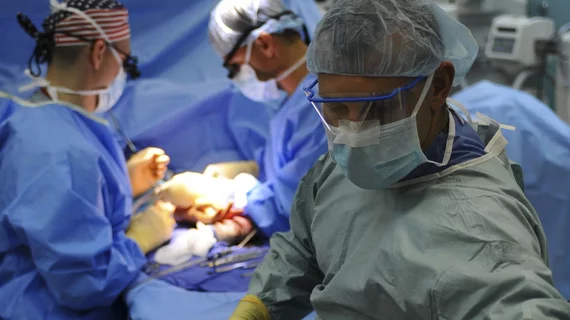AI bests expert surgeons at flagging likely complications in upcoming operations
Deep learning has proven its prowess for predicting postsurgical complications in patients scheduled for reconstruction of the abdomen to repair damage from hernias.
Although the AI faltered somewhat at forecasting pulmonary failure, it succeeded at predicting incision-site infection.
Moreover, when it came to spotting signs of looming surgical complexity, the machine outperformed seasoned surgeons.
Two out of three isn’t bad, the researchers suggest, and the most impressive aspect of the achievement may have been the diagnostic clues offered to the AI:
The models had nothing more to go on than routine abdominal CT scans acquired preoperatively.
The team that developed and validated the models describe their work in a study published July 7 in JAMA Surgery.
Lead author is Sharbel Adib Elhage, MD, of Sint Franciscus Gasthuis and Vlietland Hospital in the Netherlands; senior author is B. Todd Heniford, MD, of Atrium Health Carolinas Medical Center in Charlotte, North Carolina.
The team trained and tested three separate DL models on data from more than 9,300 scans of 369 patients.
The study was conducted as a quality-improvement project at 874-bed Carolinas Medical Center. The researchers queried a prospective database for patients with ventral (vertical center) hernias who had open abdominal-wall surgery over a five-month period ending in early 2020.
The researchers whittled the field to patients whose operations were performed by experienced surgeons and who had CT images displaying the hernia in its totality.
Analyzing the DL models’ showing with multiple metrics, they found the surgical complexity model “performed well and, when compared with surgeon prediction on the validation set, performed better with an accuracy of 81.3% compared with 65.0%.”
In their discussion, Elhage et al. assert:
This study demonstrates that deep learning models (DLMs) developed using only preoperative CT imaging inputs may successfully predict surgical complexity and the occurrence of surgical site infections in patients who underwent abdominal wall reconstruction. This technology can be used for enhanced preoperative planning and informed consent, while also laying the groundwork for future research involving image-based DLM predictive algorithms and surgical outcomes.”
Commenting on the work in an accompanying opinion piece, Amin Madani, MD, PhD, and Liane Feldman, MD, respectively of Toronto General Hospital and McGill University, make note of several inquiries the Elhage study invites.
“First, there is the question of generalizability,” Madani and Feldman write. “The performance of an AI model developed using data from a single center may underperform when the model is deployed elsewhere, not only because of the variability in technical characteristics of the input data, but also because of variations in patient demographics.”
This and other concerns over translating AI into clinical care won’t be definitively solved any time soon, they suggest.
“However,” Madani and Feldman allow, “this proof-of-concept study will undoubtedly stimulate surgeons, innovators and data scientists to continue investigating the role of machine-learning methods to improve care.”
Elhage et al. study here, accompanying commentary here (both behind paywall).

